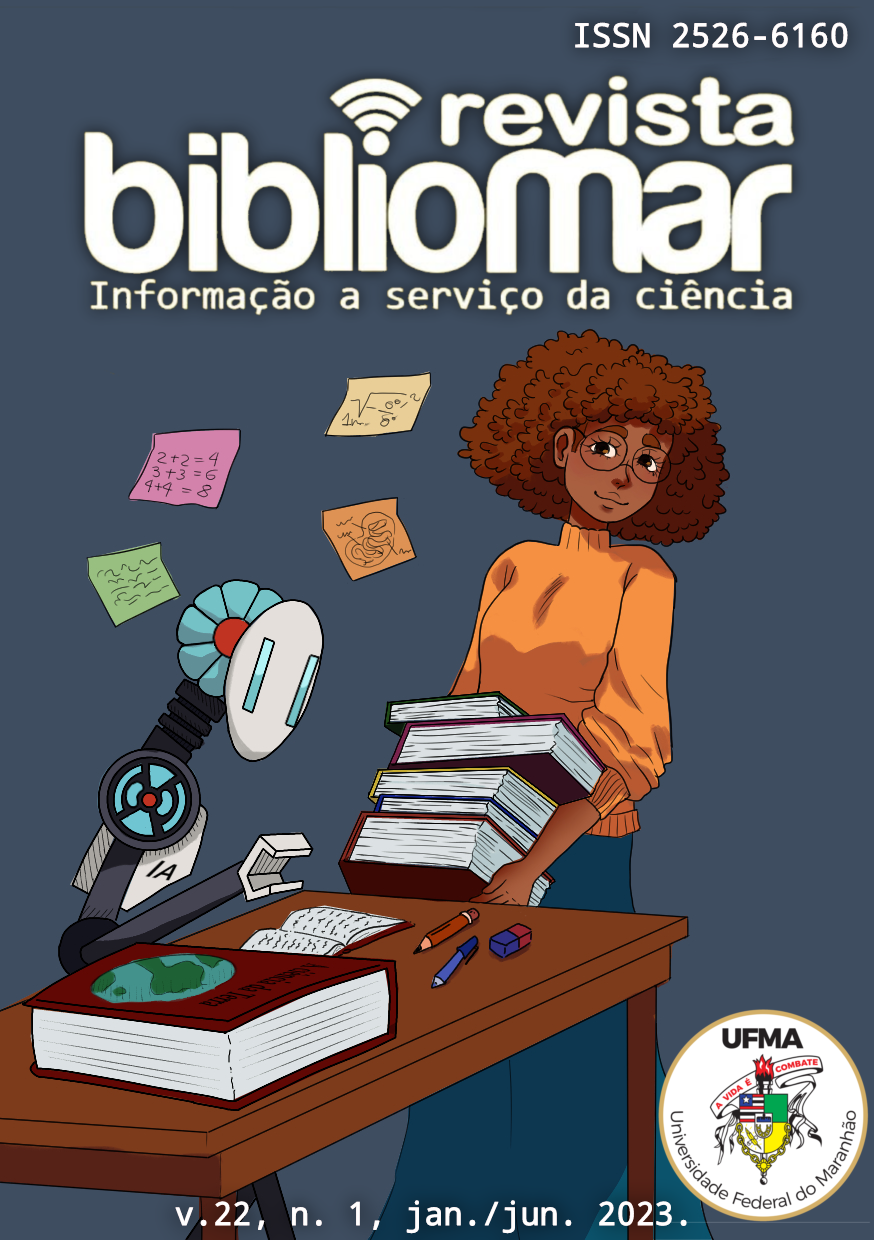FOR AN EVALUATION OF CHATGPT AS AN AUXILIARY TOOL FOR WRITING ACADEMIC TEXTS
DOI:
https://doi.org/10.18764/2526-6160v22n1.2023.6Keywords:
academic writing, ChatGPT, artificial intelligence, natural language processingAbstract
This work reflects on the human writing texts when supported by an artificial intelligence (AI) which uses Natural Language Processing. Following a brief theoretical contextualization, the methodological design is implemented. This procedure requires the chatbot "CHATGPT" to write an introduction to a scientific article based on a given abstract. A qualitative analysis is then performed between the human author's work and the text generated by ChatGPT, which implements natural language models. Finally, the capabilities of ChatGPT as an auxiliary tool for academic writing are assessed and compared.
Downloads
References
BARDIN, L. Análise de conteúdo. São Paulo: Edições 70, 2011.
BLAYER, I.; GAGO, D. Espaços e estórias na obra de Rodrigo Leal de Carvalho: encontro com o escritor. Interdisciplinary journal of Portuguese Diaspora Studies,[S. l.] , n. 5, p. 111-124, 2016.
CAMPA, R. The rise of social robots: a review of the recent literature. Journal of Evolution and Technology, n. 26, p. 106–113, 2016.
CHAROLLES, M. Le résumé de texte scolaire: functions et principes délaboration. Pratiques, n. 72, p. 7-27, 1991.
COUTINHO, C. P. Metodologia de investigação em ciências sociais e humanas: teoria e prática. Coimbra: Almedina, 2014.
D’ALTE, P. A MULHER e a Guerra do Pacífico. Leituras da representação feminina nas obras de Luís Cardoso e de Rodrigo Leal de Carvalho. Revista Rascunhos Culturais, v. 13, n. 26, p. 154-186, 2023.
D’ALTE, P. Inteligência artificial e poesia: uma reflexão sobre o caso dos “Poetry bots”. Revista 2i: estudos de identidade e intermedialidade, v. 2, n. 2, p. 165-177, 2020.
D’ALTE, P. FIGURAÇÕES da mulher na literatura de expressão portuguesa a Oriente: os casos de Luís Cardoso e de Senna Fernandes. E-Rei, revista de estudos interculturais, v. 10, p. 1-22, 2022.
D’ALTE, P. FIGURAÇÕES da mulher nos contos macaenses de Conceição, Ondina Braga e Senna Fernandes. Asas da palavra, v. 18, n. 2, p. 20-36, 2021.
GAGO, D. Travessias identitárias: representações dos refugiados em Macau na obra de Rodrigo Leal de Carvalho. ALEA, v. 20, n. 3, p. 277-298, 2018.
GYÖRGY, M.; SZŰTS, Z. What Is the Worth of Digital Content and Online Curriculum for Students? Lessons from survey conducted at BME. In: Autoria, SISY 2016; IEEE 14th International Symposium on Intelligent Systems and Informatics. Szabadka, Serbia, p. 29–31. ago. 2016; p. 245–250, 2016.
HALPERIN, R. Reading and writing poetry: The recommendations of noted poets from many lands on the teaching of poetry in secondary schools. France: Unesco, 2005.
KANDA, T.; ISHIGURO, H. Human-robot interaction in social robotics. Boca Raton: CRC Press, 2013.
KAUFMAN, D.; SANTAELLA, L. O papel dos algoritmos de inteligência artificial nas redes sociais. Revista Famecos, n. 27, p. 1-10, 2020.
LABORINHO, A. P. Notas para um Requiem. In: Carvalho, R. L. Requiem por Irina Ostrakoff. Macau: Livros do Oriente, 2015.
LÉVY, P. O que é virtual?. São Paulo: Editora 34, 1997.
MUTHUKRISHNAN, N.; MALEKI, F.; OVENS, K.; REINHOLD, C.; FORGHAINI, B.; FORGHANI, R. Brief History of Artificial Intelligence. Neuroimaging Clinics of North America, v. 30, n. 4, p. 393-399, 2020.
OPENAI. ChatGPT (Default 3.5 versão de fevereiro). [Large language model], 2023.
PEREIRA, S.J.C. O delta literário de Macau. Macau: IPM, 2015.
RAMON, M. Centro e periferia da biblioteca lusógrafa. A literatura de Macau no sistema literário em língua portuguesa. Rotas a Oriente. Revista de estudos sino-portugueses,1, 119-132, 2021.
RIBEIRO, A. S.; MARTINS, J.; SOUZA, A. G. Possibilidades e Limites para Ensino de Programação Computacional nos Anos Iniciais do Ensino Fundamental. In: VI Simpósio Internacional de Educação e comunicação, 8., 2017. Anais [...].
Aracaju/SE: SIMEDUC, 2017.
SGOBBI, F. S.; NUNES, F. B.; BOS, A. S.; BERNARDI, G.; TAROUCO, L. M. R. Interação com artefatos e personagens artificiais em mundos virtuais. Brazilian Symposium on Computers in Education, p. 642-651, 2014.
WEIZENBAUM, J. E. A computer program for the study of natural communication between man and machine. Communications of AMC, v. 9, n. 1, p. 36-45, 1966.
Downloads
Published
How to Cite
Issue
Section
License

This work is licensed under a Creative Commons Attribution 4.0 International License.
DECLARAÇÃO DE RESPONSABILIDADE
Senhores editores da Revista Bibliomar,
Declaro que submeti o artigo __________________________________ para avaliação e parecer, e que estou ciente das condições para publicação nesta revista, entre as quais destaco:
a) não há omissão de ligações ou acordo de financiamento entre aqueles que venham a se interessar pela publicação deste trabalho;
b) o trabalho é original e inédito e que não foi enviado nenhum texto similar a este, sob minha autoria, a outro periódico, durante o período em que este texto estiver sob a avaliação da Revista Bibliomar;
c) este trabalho é fruto de pesquisas por mim realizadas e não há omissão de nenhum autor por mim citado.
Respeitosamente,
Loca/data____________, ______/_____/_____
Assinatura do autor(es)
DIREITOS DE PUBLICAÇÃO
Qualquer usuário poderá ter direito de:
- Compartilhar — copiar, baixar, imprimir ou redistribuir o material em qualquer suporte ou formato
- Adaptar — remixar, transformar, e criar a partir do material para qualquer fim, mesmo que comercial.
De acordo com os seguintes termos:
- Atribuição — Você deve dar o crédito apropriado, prover um link para a licença e indicar se mudanças foram feitas. Você deve fazê-lo em qualquer circunstância razoável, mas de maneira alguma que sugira ao licenciante a apoiar você ou o seu uso.
- Sem restrições adicionais — Você não pode aplicar termos jurídicos ou medidas de caráter tecnológico que restrinjam legalmente outros de fazerem algo que a licença permita.






